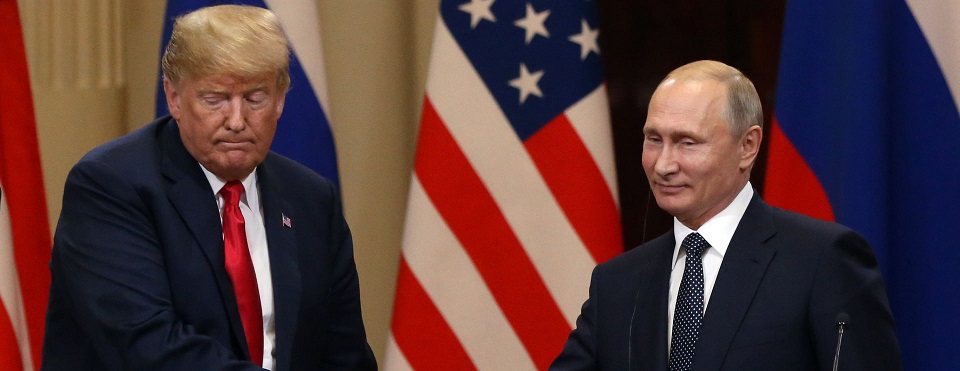Trump Under Fire But Putin Shines Bright
July 18, 2018 | Expert Insights

President Donald Trump faced harsh criticism after he failed to acknowledge Russian interference in US presidential elections during the Helsinki Summit on 16 July.
Recently, US president increased global speculation surrounding his foreign policy when he called the European Union a “foe” and NATO members “delinquent.”
Background
For more than 210 years, Russia and the United States have had a multi-faceted relationship. At one point they even shared a land border when Russia had a settlement at Fort Ross, California. In 1859, the US agreed to a proposal from Russia to purchase Alaska for $7.2 million as the latter was hopeful that the US would offset the designs of its greatest rival in the Pacific: Great Britain. Over this period, the two countries have competed for political and economic influence, and cooperated to meet mutual global challenges.
Major sanctions were imposed on Russia by western allies after the Russian military intervention in Ukraine in 2014. Since then, the US has imposed a number of sanctions on Russian entities for their involvement in Ukraine and Syria, and also for the alleged interference in the US Presidential elections.
On August 2, 2017, President Trump signed the Countering America’s Adversaries Through Sanctions Act (CAATSA) into law. This limited the amount of money Americans could invest in Russian energy projects and made it more difficult for US companies to do business with Russia. Under this act, any country trading with Russia’s defense and intelligence sectors could also face sanctions.
In Trump’s first year in office, US foreign policy has been unpredictable. US allies in Europe are finding it increasingly difficult to steer through Trump’s policies while their own priorities are undermined. German Foreign Minister Heiko Maas warned in a recent speech that “old pillars of reliability are crumbling,” in a veiled reference to the U.S. withdrawal from the 2015 Iran nuclear deal and the tariffs on EU metals exports.
Read More Here
Analysis
The summit, expected to favour Putin over the weakening Western alliance, began with Trump stating that the low state of Russo-American affairs was “US foolishness and stupidity and now, the Rigged Witch Hunt.” No comments were made regarding the annexation of Crimea, aggression in Ukraine, alleged use of a banned nerve agent on British soil or the coalition support for President Assad in Syria. Moreover, Trump criticised US intelligence agencies, Congressmen and members from his Cabinet for leading inquiries into Russia’s role in the elections.
The high-level meeting held between the two Presidents and their interpreters did succeed in the area of nuclear weapons. New START (Strategic Arms Limitation Treaty) is a 10-year nuclear arms reduction treaty which was signed by the US and Russia in April 2010. The treaty limits deployable nuclear warheads and bombs at no more than 1,550, the number of deployed missiles and bombers at 700, and the total number of deployed and non-deployed launchers at 800. Russia is now willing to extend the treaty; however, provisions regarding US conversion of arms remain under scrutiny.
It was expected that there would be no significant headway regarding Syria as the leaders merely acknowledged the need to formulate and enforce a peace treaty in the near future.
To the advantage of Putin, still basking in the glory of hosting a successful World Cup, the summit ended with former CIA Director John Brennan denouncing Trump’s performance as “treasonous,” and Republican Senator John McCain describing it as “one of the most disgraceful performances by an American president in memory.”
Joining Democrats and Republicans criticising Trump’s sycophant behaviour, House Speaker Paul Ryan stated that, “The president must appreciate that Russia is not our ally. There is no moral equivalence between the United States and Russia, which remains hostile to our most basic values and ideals.”
Unlike the 1990 Helsinki Summit where President George H. W. Bush met USSR leader Mikhail Gorbachev to conclude the decades-long Cold War, the 2018 summit failed to cater to Western interests. President Putin took advantage of growing US protectionism and misplaced political rhetoric to bring Russia out of isolationism, with the additional benefit of not being held accountable in front of the press for Crimea, Ukraine or Syria.
Assessment
Our assessment is that the outcome of the Helsinki Summit, overtly in favour of Russia, might reduce some support for President Trump and his Republican Party. We believe that the popularity of President Trump still holds good and might help the party emerge victorious in November. We feel that President Trump can leverage his personal rapport with President Putin in addressing geopolitical issues in Iran and the South China Sea.








Comments